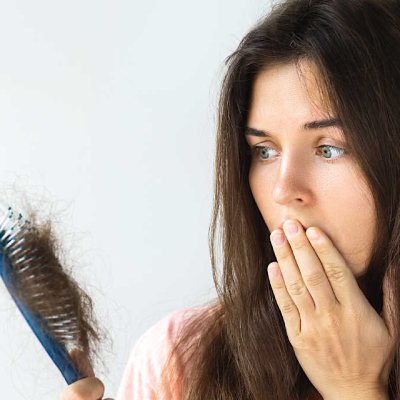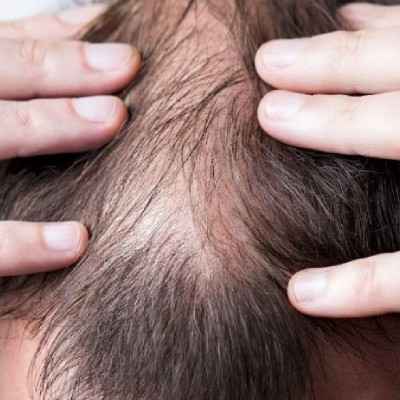Alopecia Totalis: A Patient's Guide to Causes, Signs, and Treatment

12 July 2024

Hair Experts @ AHS

Anybody dealing with hair loss can find it upsetting, but it can be particularly disheartening when it covers the entire scalp. Alopecia Totalis is a disorder that causes full hair loss on the scalp and can greatly influence a person's self-esteem and quality of life. The definition of Alopecia Totalis, how it varies from other types of alopecia, typical causes, methods of diagnosis, and possible treatments are all covered in this guide.
- What is Alopecia Totalis?
- How Does it Differ from Other Alopecia?
- What are the Common Causes of Alopecia Totalis, and How is it Diagnosed?
- What are the Symptoms of Alopecia Totalis, and How Quickly Does Hair Loss Typically Progress?
- Can Alopecia Totalis Be Prevented Or Cured, And What Are The Treatment Options?
- Conclusion.
What is Alopecia Totalis?
An autoimmune condition called Alopecia Totalis results in hair loss on the scalp. The immune system targets the hair follicles, resulting in their damage, causing all hair on the scalp to be lost. Just 0.1% of the population is affected by this ailment, but those who do can endure substantial distress. Alopecia Totalis is commonly considered a more severe type of Alopecia Areata, which causes patchy hair loss on the scalp.How Does it Differ from Other Alopecia?
Alopecia areata, which causes hair loss on the scalp and other body regions, has a subtype called Alopecia Totalis.- Alopecia Totalis, in contrast to other alopecia areata, results in total hair loss on the scalp, including the eyebrows and eyelashes.
- It often starts in childhood or early adulthood and affects both men and women equally.
- This type of alopecia is extremely uncommon, affecting roughly 1 in 50,000 people.
- Treatment for alopecia totalis is frequently more difficult than for other alopecia areata.
What are the Common Causes of Alopecia Totalis, and How is it Diagnosed?
Alopecia Totalis is believed to be an autoimmune condition, and its specific causes are yet unknown. The image above is an example of Alopecia Areata, which is the initiation of the issue that may culminate into Totalis. It indicates that the body's immune system accidentally destroys the hair follicles by attacking them. A family history of the condition, other autoimmune diseases like thyroid disease or lupus, and stress are some of the variables that may make someone more likely to develop alopecia totalis.Usually, a physical examination and a study of the patient's medical history are usually used to diagnose alopecia totalis. The hair specialist doctor could also take a sample from the scalp to confirm the diagnosis. A little piece of scalp skin is cut off during this diagnosis and inspected under a microscope for indications of inflammation or harm to the hair follicles.
What are the Symptoms of Alopecia Totalis, and How Quickly Does Hair Loss Typically Progress?
The complete loss of scalp hair is the main sign of alopecia totalis. This hair loss typically starts abruptly and without notice and can advance quickly over weeks or months. Hair loss may also affect other body hair, including the beard, eyelashes, and eyebrows.The pace of hair loss might differ from person to person, and the progression of Alopecia Totalis is difficult to predict. Hair loss can take months to develop, but it can sometimes happen quickly in just a few weeks. In contrast, once hair loss has started, it could take months or even years to regrow; in some situations, it might not. Those experiencing hair loss should consult a dermatologist or hair specialist for help identifying the cause and reviewing the various alopecia hair treatment options.
Can Alopecia Totalis Be Prevented Or Cured, And What Are The Treatment Options?
Alopecia Totalis does not have a known treatment. However, several ways exist to manage the illness and encourage hair regrowth. These remedies are intended to reduce inflammation and promote scalp hair growth. Let's examine some of the Alopecia Totalis cures in more detail.- Strand-by-Strand Cosmetic This non-surgical replacement procedure entails gluing real human hair to the scalp. The system is bonded using a specifically created bonding technique, and the hair is matched to the patient's natural hair color and texture. Strand-by-Strand Cosmetic offers a long-lasting, realistic remedy for alopecia hair loss.
- Laser Treatments Low-level laser therapy is used in this non-invasive procedure to promote scalp hair regrowth. The increased blood supply to the hair follicles caused by laser radiation encourages hair growth and reduces irritation. Alopecia Totalis can be treated effectively and painlessly using advanced laser therapy.
- Medications The scalp can be treated with topical drugs to encourage hair growth and ease irritation. These drugs, which have a strong track record for treating hair loss, include finasteride and minoxidil. However, these should only be consumed with a professional consultation from a hair doctor.
- Diet and Lifestyle Food and lifestyle recommendations can help people manage Alopecia Totalis. Nutritionists can help patients discover any underlying causes of hair loss, such as stress or a poor diet, and guide them in handling these issues.
Conclusion
The symptoms of alopecia totalis can be difficult to manage, but many treatment options are available. Working together with a healthcare practitioner to develop a treatment plan that considers your unique needs and preferences is essential. People with alopecia totalis can continue their chosen pursuits and lead fulfilling lives by remaining informed and receiving the necessary care. Because we are aware of the potential effects that Alopecia Totalis may have on a person, Advanced Hair Studio provides effective remedies to assist you in managing this issue. To discuss your treatment options, make an appointment with our experts at the AHS hair clinic that is most convenient for you.Stay Updated
Subscribe to our email newsletter for helpful tips and valuable resourses
Be an influencer
Join forces with Advanced Hair Studio! Explore exciting collaboration opportunities tailored for influencers. Let's redefine haircare together.
Connect now












